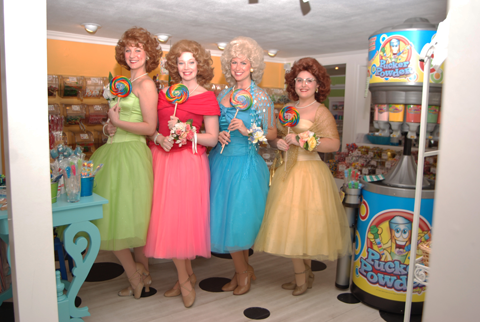
'POP PARADE The Marvelous Wonderettes are loaded with sweetness. |
Although summer is winding down (but isn’t over, let’s remember, until September 21), there’s still time for this summery, feel-good theatrical throwback to simpler times: It’s a cheerful survey of the pop music of the 1950’s and 1960’s, performed in an 1800’s barn, in a show that goes easy on the plot to focus on the songs that you probably remember if you were in high school in 1958, and that you may know even if you didn’t. The year marks the senior prom of the Marvelous Wonderettes, four teenaged singers at Springfield High, in a show that is called, indeed, The Marvelous Wonderettes. We see and hear them both in 1958 and a decade later, in this sweet and beautifully sung production, directed by Edward Reichert at the Arundel Barn Playhouse, a theater that, hung as it is with old ploughs, marionettes, and playbills, is fully at home with nostalgia.
Up onstage, it’s cut-out paper hearts, cupids, and a punch bowl for the Super Senior Prom. The originally scheduled prom-night entertainment, the boys’ glee club, has been disinvited to perform (on account of smoking-related improprieties), so it’s a lucky break for cheerleaders and chorus members Betty Jean (Lexi Duffy), Cindy Lou (Kate Turner), Missy (Kate Grindle), and Suzy (Danae DeShazer), who get the gig and run with it, with charm and adolescent antics.
The girls, dressed in vintage prom dresses of pink, green, blue, and yellow, jump in with the timelessly recognizable arpeggios of “Mr. Sandman,” and their singing is immediately beautiful. We learn more about each of the broadly-drawn teenagers over the course of the prom. Grindle’s Missy, short and buxom in cat’s-eye glasses, is the shy team leader. Duffy’s Betty Jean is a bit of a clown and prone to acting out (with her compulsive repetition of the word “butthead”) while Turner’s Cindy Lou, Betty Jean’s best friend and romantic rival, is poised, coiffed, and a bit of a princess. Finally, Suzy is blonde enough, in both the literal and common sense of the word, to have nothing but kindness and glee for everyone onstage and off.
Their singing is sweet and clear, and will please those with a fondness for throwback songs like “Lollipop,” “Dream Lover,” and “Born Too Late.” A Merengue-light backstory and plot leads us through the context in the girls lives to be singing these songs, including Betty Jean and Cindy Lou’s romantic rivalry and Missy’s crush on the chorus teacher (“Mr. Lee”). There are minor tiffs, an audience-participation vote for prom queen, and some simple fun with props. Betty Jean has an array of instruments she brings onstage, to drown out Cindy Lou, and the girls hold up four lettered lollipops—in a nice little aside, they first get them out of order, and instead of spelling “LOVE,” they spell “EVOL.”
Evolution is an idea that the premise certainly sets us up for: After a first act set in 1958, on the cusp of graduation, act two brings them back in 1968 for their class reunion. What’s changed? Well, the stage is now set with flower-on-flower action, the girls now wear sequined shift dresses with chiffon sleeves, and they kick and step with just a little more soul, now wearing white gogo boots, to songs like “Heatwave,” “It’s My Party,” and “Respect.” Roger Bean’s script keeps most things narrative on a pretty tight leash, but that leash leads to some funny, tongue-in-cheek conflations, like how Cindy Lou’s beloved son of a preacher man was also the leader of the pack whom she met at the candy store.